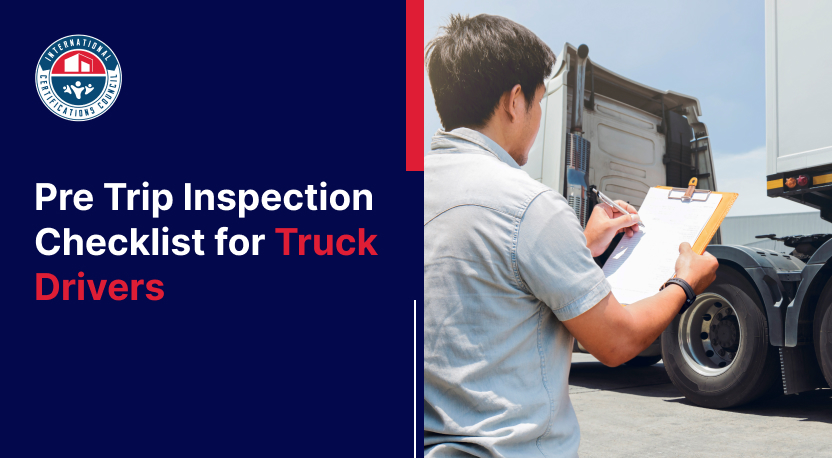There is only so much you can do on your own. As a commercial truck driver, you may always feel constrained. You will notice that you tend to forget a lot of things when trying to maintain compliance with the rules defined by the DOT. If there is an unexpected audit tomorrow, you are most likely to fail. It is not that you do not have any of your documents in order but yes, there will be a few aspects that could go missing. Maybe you haven't inspected your vehicle recently. Maybe one of your driver qualifications is not on record. Even the slightest error on your part can leave your career hanging in the air and your driving permits and licenses suspended indefinitely. You don't want any of that. Let's understand in this blog how to create a dot and fmcsa compliance checklist as a truck driver and make sure that you are always at the top of your game.
1. Driver Qualifications
This is the very basic requirement that every truck driver has to fulfill. Make sure that you meet all the rules explained by the Department of Transportation before you enter this sector. Your DQF which is your driver qualification file should always have records pertaining to:
- Commercial driver’s license and appropriate endorsement
- A copy of your current medical examiner certificate or maybe the original document
- Proof of valid insurance
- Motor vehicle records of the previous 3 years
- Employment application
- Drug test records including the pre-employment test records
- Mandatory entry-level training with proof
- Records required by CDL endorsements
2. Hours Of Service Compliance Rule
The hours of service rule (HOS) is one of the most complicated requirements that every truck driver has to fulfill. This rule restricts the number of hours that you can spend behind the wheel or driving a commercial vehicle to be more precise. The amount of time that you are expected to spend driving a commercial vehicle is going to be different depending on the situation. You must spend your break time exactly the way you have been directed to. The hours of service regulation is not that difficult to track anymore. The electronic logging device that is supposed to be installed in every commercial vehicle makes it easier for the authorities to track the number of hours you spend driving and resting. So yes, there is no escaping this little rule.
3. Vehicle Inspection And Maintenance Requirement
According to International Certification Council, the vehicle inspection and maintenance rule is absolutely unavoidable. It applies to every commercial motor vehicle equipment that is being used in any particular company or by any commercial motor vehicle driver.
- Annual inspections are mandatory and they must keep a record of the previous 14 months, a minimum
- A driver vehicle inspection record is to be maintained both before and after the trip
- Inspection reports post the trip including problems with the vehicle going back at least 90 days
4. Drug And Alcohol Screening Rule
The drug and alcohol screening rule is mandatory and you are going to need proof of compliance without fail. The Department of Transportation and the FMCSA have listed down a few requirements such as:
- Complete documentation of the testing programs and policies of the company
- Generation of reports that cover all the tests that are performed including the past calendar year (these shall comprise pre-employment screening, random tests, reasonable suspicion testing, and follow-up procedures)
- Proof of reasonable suspicion training for every supervisor working in the company
Remember, as a truck driver, you will have to pass these tests and the results should always come out negative. If any drug or controlled substance or an unusual amount of alcohol is found in your system, working in a safety-sensitive position will not be feasible any longer. It is not just the driver who is subject to mandatory testing but also the supervisors and every safety-sensitive employee such as dispatcher, mechanic, warehouse worker, and substitute driver.
5. Hazardous Materials Regulation Compliance
A hazmat employee or driver working in the transportation of hazardous materials will fall under the hazardous materials regulation compliance rule. They will be expected to follow these requirements and also show proof of compliance. The rules and regulations laid down by the Department of Transportation pertaining to hazardous materials are very complex. Also, hazmat audits are the most detailed and complicated audits that one can go through. It is better to educate your drivers and every hazmat employee in a hazmat awareness training course that is relevant, frequently updated, and reliable.
6. Important License And Permits
A commercial truck driver also needs to pay attention to the licenses and permits the carrier they are working for has obtained. These licenses and permits are going to vary by the state they work in. However, there are a few common requirements such as:
- The US DOT Carrier Number
- The Motor Carrier Number
- Commercial driver's license for every driver (yes, the carrier needs to make sure that all their drivers carry one)
- Unified Carrier Registration (UCR)
- Standard Carrier Alpha Code (SCAC)
Now these requirements are something that the truck drivers, safety-sensitive position holders, hazmat employees, and also the employer himself need to take care of. Before they can even commence their business activities, these licenses and permits must be in place.
7. Miscellaneous Requirements To Fulfill
Unfortunately, the requirements mentioned above do not include everything. You will also need:
- Proof that every driver working for the company has been provided with a copy of the latest FMCSA regulations
- The MCS 90 form for the liability coverage of the fleet
- DOT security plan
- International registration plan for every qualifying vehicle
- Fuel tax records on the international fuel tax agreement
- A copy of the FMCSA rule book in your office
In The End, Always Remember
As a truck driver or any other position holder in the transportation and logistics sector, it is not only the responsibility of your employer but your prerogative as well to make sure that you remain constantly updated on the latest developments that are happening in your industry. Enrolling in relevant courses provided by industry leaders such as ICCouncil is one approach that you can completely rely on. They don't just equip you with the latest knowledge, skills, and information that keep you relevant and valuable to your company but also give you proof of training. Think about it seriously.


